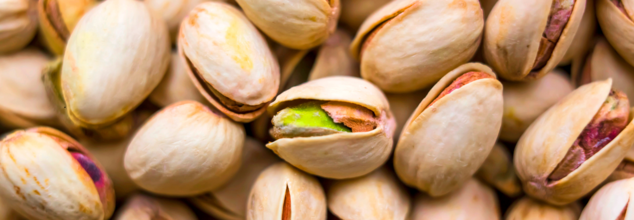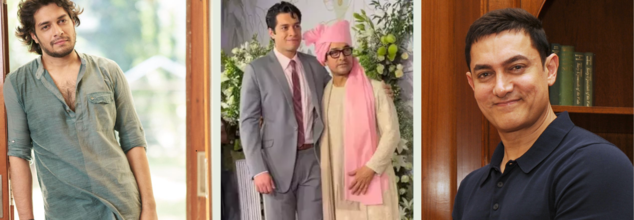- Health Conditions A-Z
- Health & Wellness
- Nutrition
- Fitness
- Health News
- Ayurveda
- Videos
- Medicine A-Z
- Parenting
- Web Stories
How Does Pistachios Help You Improve Your Eye Health

Pistachios for eye health (Credit-Canva)
A recent study conducted by Tufts University has revealed the remarkable eye health benefits of pistachios. By incorporating two ounces of unsalted, shelled, dry-roasted pistachios into their daily diet for 12 weeks, participants experienced a significant improvement in their macular pigment optical density (MPOD). This essential pigment plays a crucial role in protecting the macula, a vital part of the retina responsible for sharp central vision.
Importance of the Macula
The macula, a small area in the center of the retina, is responsible for tasks like reading, driving, and recognizing faces. Age-related macular degeneration (AMD) is a leading cause of vision loss, gradually deteriorating the macula and impairing central vision. Early detection and proactive measures are essential in managing AMD.
Macular degeneration happens to a lot of people even younger people who smoke or have a family history. Other risk factors also include being overweight and having hypertension.
Pistachios are Lutein Powerhouse
Pistachios are an excellent source of lutein, a powerful antioxidant that accumulates in the macula. This pigment acts as a natural filter, absorbing harmful blue light and protecting the delicate retinal tissues. The study showed a significant increase in lutein levels in participants who consumed pistachios daily.
While the treatment for macular degeneration that is more advanced is possible, if you catch it early on, you can treat it with proper nutrition or supplements.
Benefits Lutein's For Your Eye
Beyond its role in eye health, lutein offers a range of health benefits. As a fat-soluble antioxidant, it can cross the blood-brain barrier, protecting brain cells from oxidative damage. Additionally, lutein may contribute to heart health by reducing inflammation and improving cholesterol levels.
There are many things that have lutein like heart-healthy fats that are in avocados and dark-leafy vegetables like spinach and broccoli. Experts recommended ,you try these with nuts, seeds and healthy oils like fish oil.
Zeaxanthin: A Synergistic Partner
Zeaxanthin, another carotenoid pigment found in colorful fruits and vegetables, works synergistically with lutein to protect the macula. Consuming a diet rich in both lutein and zeaxanthin can further enhance eye health.
Foods like orange peppers, kale and green peas have loads of zeaxanthin and pairing these foods that have hear-healthy fat or you can have it with pistachios.
Maintaining Healthy Vision
To maintain optimal eye health, it's essential to adopt a comprehensive approach. Regular eye exams are crucial for early detection of eye conditions like macular degeneration. Additionally, a balanced diet rich in fruits, vegetables, and whole grains can provide the necessary nutrients for eye health. By incorporating nutrient-dense foods like pistachios into your diet, you can take proactive steps to protect your vision and reduce the risk of age-related eye diseases.
Tips to Protect Your Eye Health
While diet plays an important role to make sure your eye health stays top-notch, here are some other tips that will help you protect your eyes.
Sunglasses
Wear sunglasses that block both UVA and UVB rays to protect your eyes from harmful UV radiation.Safety Glasses
Wear protective eyewear when engaging in activities that could potentially harm your eyes, such as sports or DIY projects.
Computer Eye Strain
Follow the 20-20-20 rule, every 20 minutes, look at something 20 feet away for 20 seconds.
Contact Lens Hygiene
Clean and store your contact lenses properly to prevent infections.
Aamir Khan Opens Up About His Son Junaid's Struggle With Dyslexia

Credits: IMDb, Facebook, Wikimedia Commons
Taare Zameen Par actor and director Aamir Khan has recently opened up about his son Junaid's struggles with dyslexia, days ahead of the release of Sitaare Zameen Par, which would be a spiritual sequel to the film.
The film aims to put focus on specially-abled individuals.
What Was The Film About?
The 2007 release, as notes the 2009 study published in Annals of Indian Academy of Neurology, titled Taare Zameen Par and dyslexic savants, portrays the tormented life at school and at home of a child with dyslexia and his eventual success after his artistic talents are discovered by his art teacher at the boarding school.
The film shifts its focus on learning disability, which, explains the study, is usually defined as an unexpected, specific, and persistent failure to acquire efficient academic skills despite conventional instruction and adequate intelligence and sociocultural opportunity. Although all fields can be affected, it seems that learning problems can be classified into two categories:
- The largest group of children has problems with language skills including reading and spelling, this is the dyslexia group, with the basic phonologic processing disabilities
- The other group have greater problems with problem solving, with arithmetic and visuospatial problems, and with motor and tactile perceptual problems. These children are from a large group of those with nonverbal learning disabilities. It comprises the children with dyscalculia.
What Did Aamir Khan Say?
As per Filmfare, the actor talked about his son Junaid's struggles and said, ""Maybe this is the first time I'm saying it... The person I'm going to talk about has already spoken about this publicly. So now I can talk about it openly. I'm talking about Junaid - my son Junaid... Junaid is dyslexic."
He also revealed the script of Taare Zmeen Par, which had been penned by Amole Gupte, thus directly and deeply bore an impact on him.
"I used to scold Junaid. I was like Nandkishore Awasthi in the beginning," he said, in a reference to the film's protagonist's strict and frustrated father.
"I would tell him, 'Junaid, how can someone write so badly? No one can even read this'. When he used to read, he would say 'from' instead of 'for'. Whenever he saw an 'F', he would just guess the word - of, from, for."
In fact in a previous interview, Junaid also accepted that he has dyslexia and both his parents learned about this learning disability only after they heard the script of Taare Zameen Par.
Neither of my parents were particular (about my results)... I was also diagnosed with dyslexia very early on. So, I think they were mindful of that, especially in schooling... When they heard the script of Taare Zameen Par, they were like, 'Ek second... We have seen this in our lives'. And actually, it was at that point that they took me to a specialist, and I was diagnosed with dyslexia," he had said.
What Is Dyslexia?
As per the British Dyslexia Association, it is a set of processing difficulties that affect the acquisition of reading and spelling.
The International Dyslexia Association describes is as a language-based learning disability, which refers to a cluster of symptoms with specific language skills, particularly reading.
About 13–14% of the school population nationwide has a handicapping condition that qualifies them for special education. Current studies indicate that one half of all the students who qualify for special education are classified as having a learning disability (LD) (6–7%). About 85% of those students have a primary learning disability in reading and language processing. Nevertheless, many more people— perhaps as many as 15–20% of the population as a whole—have some of the symptoms of dyslexia, including slow or inaccurate reading, poor spelling, poor writing, or mixing up similar words. Not all of these will qualify for special education, but they are likely to struggle with many aspects of academic learning and are likely to benefit from systematic, explicit, instruction in reading, writing, and language.
National Eggs Day: Is It Safe To Eat Eggs Amidst The Current Bird Flu Climate?

(Credit-Canva)
National Egg Day falls on 3rd June and is observed to mark the decades of research and debates regarding nutrient-rich food. Whether it was the simple question of ‘how many eggs can you eat?’ Or are they safe for kids to eat, etc. With the current on-going bird flu cases, many people are concerned about whether eating eggs is safe or not.
Over the last month, the H5N1 bird flu has spread to 107 groups of birds (both commercial farms and backyard flocks) across 18 states, affecting nearly 18 million birds. Since the outbreak began in 2022, 145 million chickens, turkeys, and other birds have been killed to stop the virus from spreading. To put this in perspective, the U.S. has about 380 million egg-laying chickens and over 9 billion broiler chickens.
Is It A Threat To Human Safety?
Despite the widespread bird flu in animals, experts say the chance of humans catching the illness is still low. Since March 2024, there have been 67 confirmed human cases of bird flu in the U.S., with only one death linked to it. Experts emphasize that properly handled, stored, and cooked eggs are safe and won't lead to bird flu infections in people. Nonetheless, the outbreak has raised worries about the virus spreading to humans and has also caused egg prices to jump, leading to a nationwide egg shortage.
Recently, an 11-year-old Cambodian kid passed on due to zoonotic transmission of bird flu, this is the fourth confirmed case of human bird flu, and all cases so far have been fatal. However, the cases have not yet caused a food safety threat. The The Food and Drug Administration (FDA) explains that there is no evidence that the virus can be transmitted to humans through properly prepared food. Safe handling and preparation is very important, when it comes to cooking poultry, eggs or any other animal products, one must make sure there is not cross contamination between the raw and cooked food.
Safety Tips for Eggs and Other Products
The bird flu has also been found in dairy cows. However, experts say pasteurized milk is safe to drink because the heating process kills the virus. Some raw milk products, though, might carry a risk. Raw pet food has also been linked to bird flu illness and deaths in cats. Importantly, bird flu has not been found in chicken or beef for human consumption. Still, experts advise cooking all meat thoroughly to kill any potential virus traces.
FDA provides simple steps to lower the risk of illness when it comes to eggs. They suggest choosing pasteurized eggs. When buying and storing eggs, the FDA recommends:
- Only buying eggs that have been kept refrigerated.
- Storing eggs at home in a clean refrigerator.
- Using eggs within 3 weeks of buying them.
- Refrigerating egg dishes like casseroles and eating them within 3 or 4 days.
One expert recommends avoiding cracked eggs or those past their expiration date. They also note that organic eggs are not necessarily safer than non-organic ones, as both follow the same safety rules.
Safest Way to Cook Eggs
While pasteurized eggs have a lower risk of infection because pasteurization effectively kills viruses, including bird flu, and bacteria. When cooking eggs, FDA officials advise:
- Washing hands, utensils,, and work surfaces with hot, soapy water before and after touching raw eggs.
- Cooking eggs until both the yolk and white are firm.
- Making sure scrambled eggs are fluffy and not runny.
- Cooking casseroles and other dishes with eggs to 160 degrees Fahrenheit.
- Serving cooked eggs right away. Don't leave egg dishes out for more than 2 hours.
- Using an insulated cooler to transport eggs and egg products for picnics or gatherings.
- Reheating any leftover egg products from the fridge to 165 degrees Fahrenheit.
Weight-Loss Drug Ordered Online Leaves UK Woman With Hole In Esophagus

Credits: Kennedy News and Media
tIn an age of quick fixes and instant results, the promise of rapid weight loss—especially through online pharmacies—can feel like a miracle. But behind the glossy ads and glowing testimonials lies a growing and dangerous trend: self-medicating with powerful weight-loss drugs without proper medical guidance.
Aimee’s Story: A Search for Help Turns Life-Threatening
Aimee Chapman, a 34-year-old from Southampton, had been struggling with her health for some time. Like many others, she hoped that shedding some weight might ease her symptoms and help doctors take her more seriously. When she came across weight-loss injections online, they seemed like the perfect solution—easy to order, promising fast results, and no waiting room required.
And at first, they worked. Within just four months, Aimee lost nearly 60 pounds. But soon, the results took a terrifying turn. She felt weak, dizzy, and collapsed frequently. She stopped eating and began vomiting—sometimes up to 60 times a day. When she saw blood in her vomit, she still thought it was a virus. But her body was telling a different story.
One day, after experiencing severe chest pain, Aimee was rushed to the hospital. What doctors discovered was both rare and dangerous: a hole in her esophagus—the tube that carries food from the mouth to the stomach. This hole allowed food and fluids to leak into her chest cavity, risking deadly infections. Her liver also began to fail, and she was immediately taken to the ICU.
The Medical Warning Signs
Aimee spent two weeks in the hospital. Though she narrowly avoided needing a liver transplant, doctors confirmed the cause was linked to the weight-loss injections—but couldn’t determine exactly how the damage occurred. Even after being discharged, her body continued to show signs of distress: she lost large amounts of hair, likely from nutritional deficiencies caused by the sudden and drastic weight loss.
Her story serves as a powerful reminder that “easy” weight loss solutions can come with life-altering consequences.
The Real Risks of Self-Medicating
Aimee’s experience is not an isolated one. As the popularity of online weight-loss treatments grows, so do the risks—especially when people bypass healthcare professionals. These medications often contain powerful ingredients that can have serious side effects, interact with existing health conditions, or, in rare cases like Aimee’s, cause permanent damage.
Many online sellers are not regulated, and the quality and safety of the drugs they offer cannot be guaranteed. What seems like a shortcut can quickly turn into a health emergency.
Your Health Deserves Medical Oversight
If you’re considering weight-loss treatments, always speak with a qualified medical professional. A trusted doctor can help you explore safer, personalized options—whether that means supervised medication, dietary plans, or lifestyle changes.
© 2024 Bennett, Coleman & Company Limited

